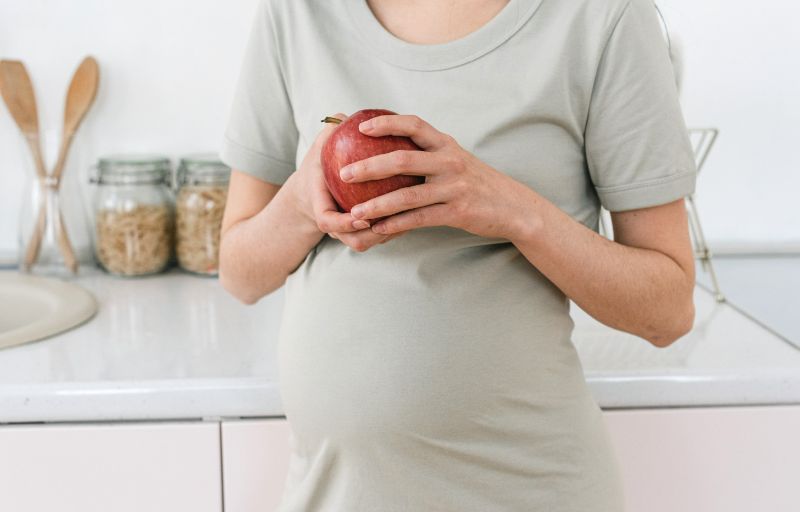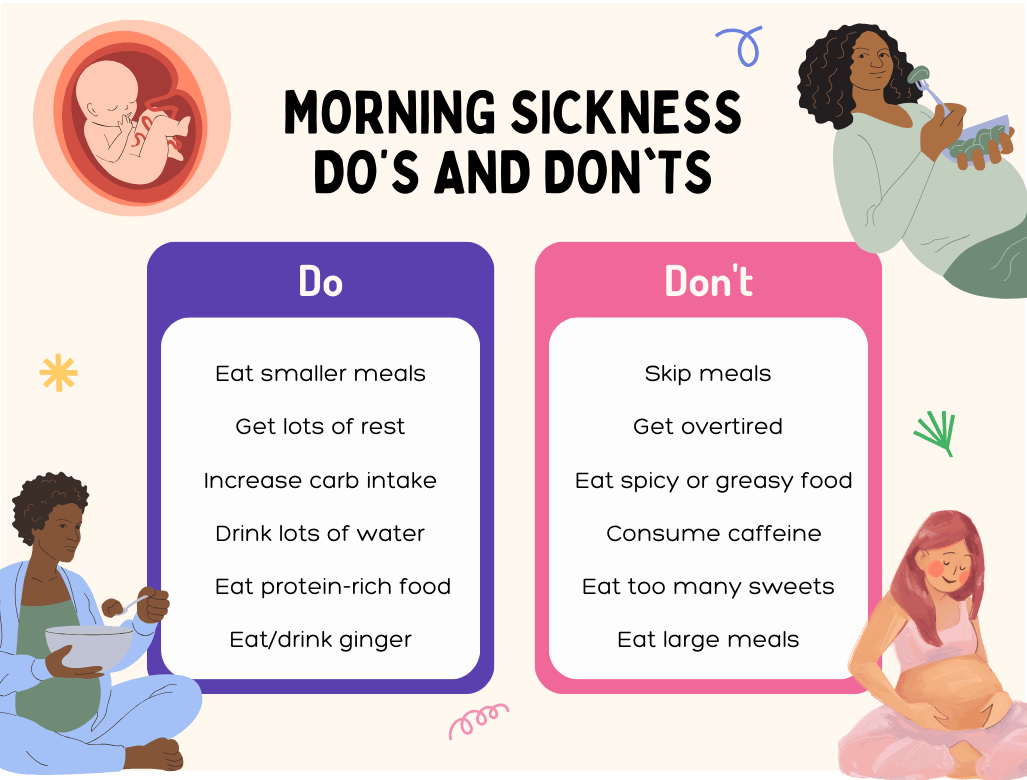Table of Contents
- What causes nausea during pregnancy?
- Why do I feel nauseous after I eat?
- Why do I feel nauseous when I wake up?
- Third-trimester nausea
- Other triggers that can cause nausea
- How to combat pregnancy nausea
- Top 10 foods that help fight pregnancy nausea
- Top 10 recipes to combat nausea throughout your pregnancy
- Are there foods I should avoid during pregnancy?
- When nothing seems to help, seek medical advice
- Conclusion
I still recall the day we saw that faint double line on the pregnancy test. After one miscarriage and a year of infertility, we were finally pregnant with our first child. Almost immediately, the questions from concerned loved ones began. How are you feeling? Do you feel tired? Are you nauseous? I was one of the lucky ones though, and I didn’t experience any nausea during pregnancy.
My best friend, however, who was also pregnant at the time, was violently ill throughout her entire pregnancy. There was very little she could keep down, and she battled feelings of nausea all day long, not just in the morning. In conversation with her, I learned some tips and tricks for what helped her manage her severe nausea during pregnancy, as well as some key foods and recipes that helped to keep her nourished while combatting nausea at the same time.
While every woman is different, there are some commonalities when it comes to nausea during pregnancy. There are certain foods that are known to help, while others are known to make things even worse. Here, we help to shed light on this pregnancy issue, in hopes of helping you navigate your own pregnancy a little more easily.
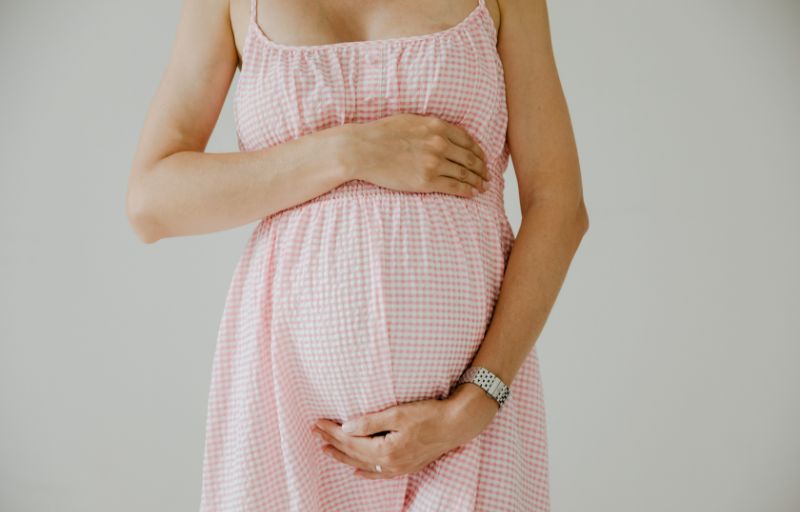
What causes nausea during pregnancy?
Despite how miserable it makes women feel, it is suggested that having morning sickness during your first trimester is actually a good sign. Studies have shown that women who experience nausea during the first trimester have a lower risk of miscarriage than women who do not experience it.
While that little tidbit of information caused me some panic during the start of my pregnancy, as I experienced absolutely zero nausea, it is not a cause for concern if you don’t have any symptoms of nausea or morning sickness.
But, what actually causes women to feel nauseous during pregnancy?
While the exact cause of nausea during pregnancy is unknown, there are a number of factors that can contribute to it. Mainly, the increase in hormones during pregnancy is what causes women to feel sick. Dr. Mary Marnach explains that the primary hormone responsible for this is called human chorionic gonadotropin (HCG), which is produced by the placenta once a woman’s egg is fertilized.

The increase in this hormone is known to be one of the causes of morning sickness during pregnancy, as studies have shown that women who have higher HCG levels or who are pregnant with twins (and therefore higher HCG levels) often experience more nausea.
Another hormone known to contribute to this pregnancy issue is estrogen, which increases once a woman is pregnant. Estrogen can also cause additional nausea or even an intolerance to certain foods.
While morning sickness is typically at its worst in the first trimester and eases off by about week 14 or so, some women unfortunately experience nausea throughout their entire pregnancy.
Why do I feel nauseous after I eat?
There is no real answer for why many women feel sick after eating, as there can be a number of reasons. Some of the reasons include:
- An increase in the HCG hormone level
- Higher estrogen levels
- Pregnancy heartburn, which usually begins at around 8 weeks
- A heightened sense of smell, which can trigger nausea
- Eating the wrong types of food, such as greasy or spicy foods
- Additional stress or fatigue
- Being genetically predisposed to pregnancy nausea
- A more relaxed digestive system, as pregnancy hormones cause the muscles of the digestive tract to relax

Why do I feel nauseous when I wake up?
Many women experience a surge of nausea in the morning when they first wake up, coining the term morning sickness. But, why does this primarily happen in the morning? Dr. Tomislav Mestrovic explains that the hormone progesterone causes the stomach and intestines to relax, which can therefore cause excess stomach acids that will in turn make many women feel nauseous. And, since these hormones primarily trigger acid reflux at night, women often feel sick in the morning.
Morning sickness can also be attributed to lower blood sugar levels after a night of not eating. The placenta is working hard all night, requiring significant amounts of energy and burning a lot of the body’s fuel (i.e. blood sugar). This results in lower blood sugar, which in turn can make some women feel nauseous in the morning.
Third-trimester nausea
You’ve made it to the third trimester, things are going well with your pregnancy, and yet you are still vomiting every morning. What is the deal with third-trimester nausea?
The reason some women still battle with nausea in their third trimester is not so much due to hormone levels anymore, but rather because there simply isn’t enough room to digest food properly anymore.
The baby is getting larger, and there is less and less room in the torso for food to be digested properly, resulting in heartburn and nausea. Slower and more difficult digestion can also result in constipation, which in turn can exacerbate nausea.
Those good old hormones are still at play as well, even though they likely have settled down a bit since the first trimester. Hormones can still be causing some of the morning sickness you might be experiencing.

Other triggers that can cause nausea
While there can be many reasons women experience nausea during pregnancy, there are a few key triggers to avoid if you are prone to morning sickness or nausea.
- Lack of sleep can bring on feelings of nausea, so make sure you are getting enough rest.
- Added stress can also exacerbate morning sickness.
- Spicy or greasy foods really don’t mix well with a sensitive stomach, so tell that baby to pick gentler cravings!
- Your prenatal vitamin can also increase symptoms of nausea; check with your doctor if symptoms persist.
- Being exposed to strong smells like cigarette smoke or strong cooking smells can cause some women to feel nauseous.
- Eating large meals – try to eat smaller meals more regularly throughout the day.
How to combat pregnancy nausea
While there is no set cure for morning sickness, there are a few things you can do to minimize its severity. No matter what trimester you are in, these simple tricks can help to stave off those pesky feelings of nausea.
Ginger
Ginger has been used for centuries as a natural solution to nausea and other stomach-related illnesses. Try drinking some ginger tea or nibbling on a few ginger cookies to calm your stomach. There are even ginger chews or lozenges that you can buy at your local pharmacy.
Stay Hydrated
It is so important that you keep your body hydrated, especially if your morning sickness is causing you to actually vomit. Dehydration can bring on additional feelings of nausea, so be sure to keep sipping liquids throughout the day.

Avoid Caffeine
Caffeine isn’t great for a developing baby anyway, so it’s best to stay away from it throughout pregnancy, or at least have it in small doses. But, if you’re battling morning sickness, you might consider skipping it altogether.
Become a Grazer
Instead of eating large meals, try grazing like a toddler – picking at little snacks and meals throughout the day. This limits the stress put on your digestive system, making it easier for your body to process food, and minimizing feelings of nausea.
Use Peppermint
Smelling, drinking, or eating peppermint can help wonders with those pesky feelings of nausea. Suck on a peppermint candy, drink a peppermint herbal tea, or simply smell some peppermint essential oil whenever you are feeling nauseous.
Increase Carbs
Carbs like toast, plain rice, or crackers are great for calming the stomach and making it possible for you to eat some food. Stick with fairly mild toast or crackers, nothing too spicy. But, increasing your carb intake can help to stave off nausea.
Have a Candy
Many women can attest to the fact that sucking on hard candy, especially citrus-flavored or sour candies, can help wonders with combatting feelings of nausea. Keep a stash of your favorite hard candies around the house for those moments when nausea hits you.
Top 10 foods that help fight pregnancy nausea
There are many natural remedies out there that can help to fight pregnancy nausea, as listed above. There are also good foods that can help with this problem as well. Here, we have compiled a list of the best food for morning sickness, according to moms who have battled nausea to varying degrees throughout their pregnancy.
1. Salty Crackers
While I was very lucky to not experience significant morning sickness during my pregnancy, whenever I did have a bout of nausea, salty crackers were always my go-to remedy. They do wonders in helping to calm the stomach and settle those feelings of nausea. Keep some by your bedside table for those moments during the night when you are feeling nauseous.
2. Ginger
Ginger was the number one remedy that my friend used throughout her pregnancy, as she battled severe morning sickness. She began her day with ginger tea, and she sucked on ginger drops throughout the day. According to her, this was the best natural remedy out there.
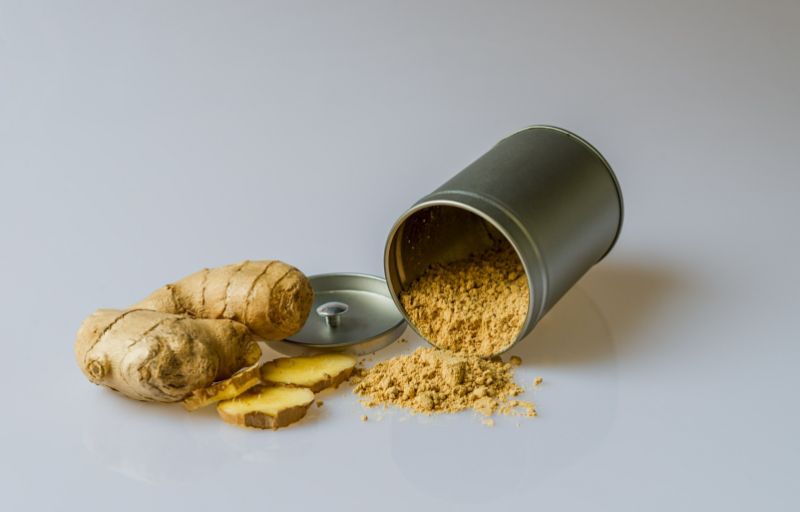
3. Plain Rice
Many parents are familiar with the B.R.A.T. diet to feed their children when they are sick with an intestinal bug. The acronym stands for Bananas, Rice, Applesauce, and Toast, and these four foods are the best things to eat when feeling nauseous. Plain rice is a nice comforting food that is easy to digest and calming to the stomach.
4. High-Protein Foods
It is imperative that pregnant women get enough protein in their diet, both for their own health and the healthy development of the baby. What’s more, foods like eggs, chicken, and peanut butter that are high in protein can help minimize feelings of nausea. They do so by increasing a hormone known as gastrin, which in turn helps with digestion.
5. Cucumbers
Considering that cucumbers contain about 96% water, they are a great choice for keeping hydrated, which in turn will help to minimize nausea. Cucumbers are part of the Cucurbitaceae or Melon Family, consisting of melons, gourds, squashes, and luffas. Other melons like watermelon are also very beneficial for combatting nausea.
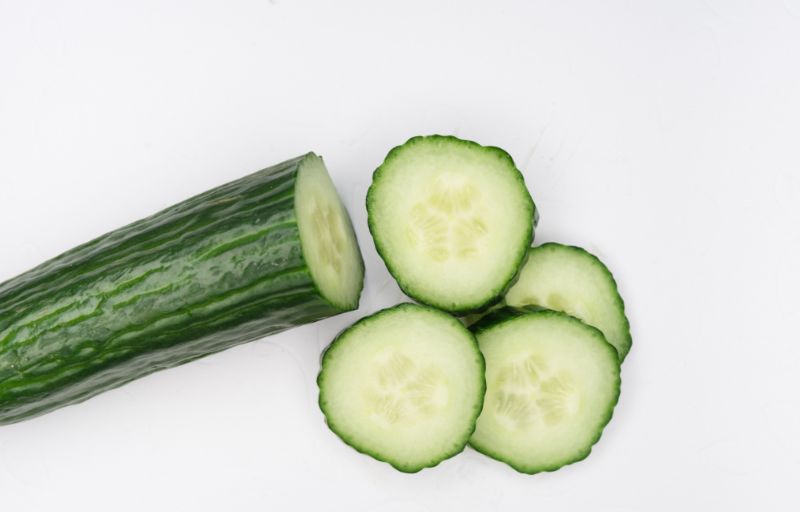
6. Bananas
Another member of the B.R.A.T. diet, bananas are known to calm the stomach and are easy to digest. This makes them a great choice if you are struggling with morning sickness, as they not only settle the stomach, but they provide essential nutrients to keep you and your baby nourished.
7. Toast
As mentioned before, toast can be a great option if you’re feeling nauseous, as it is easy to digest and bland enough to not irritate a sensitive stomach. Try layering a little peanut butter on it for added nourishment, or top it with an egg or some fresh fruit.
8. Peppermint
Whether you are eating it, drinking it, or smelling it, peppermint can do wonders to combat morning sickness. Make a peppermint tea or suck on a peppermint candy to stave off those pesky feelings of nausea.
9. Broth
Plain broth can be a great way to get added liquids into you, and it is also packed with nutrients and is calming to the stomach. Make it even healthier by making your own broth. Boil a chicken carcass in water on low heat overnight to make a healthy bone broth that will nourish you and your baby.
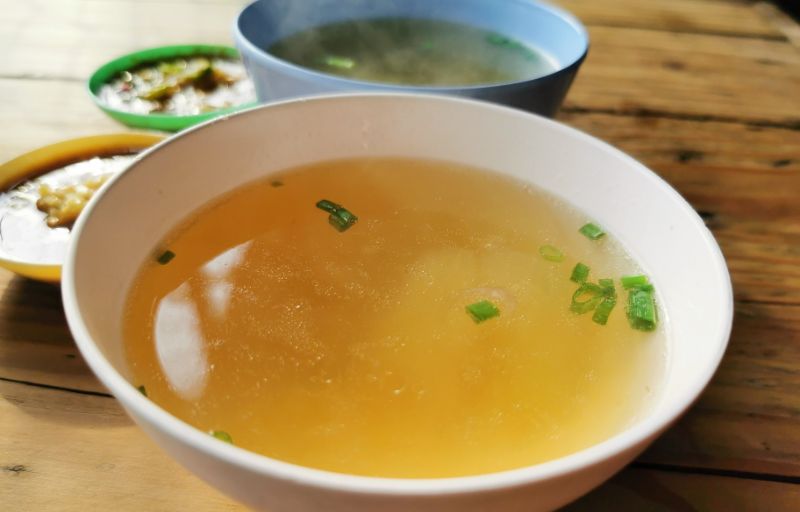
10. Applesauce
Our final member of the B.R.A.T. diet, applesauce. Known to settle upset stomachs, applesauce is a nice, tasty way to calm that morning sickness while giving your body a healthy dose of fruit. It is also full of added vitamins from the apples and water to hydrate you.
Top 10 recipes to combat nausea throughout your pregnancy
There are not only certain foods that help with pregnancy nausea, but there are also some delicious recipes that are nutritious and easy to digest when struggling to keep food down. Here are our top 10 favorite recipes for battling pregnancy nausea.
1. Nausea Popsicles
Loaded with a delicious combination of fresh fruits and ginger, these popsicles are not only super healthy, but they really do the trick in warding off nausea.
2. Turkey and Vegetable Soup
You can’t go wrong with soup, as it is packed with nutrients and water to hydrate you. If textures are causing you to feel icky, try pureeing the soup so it has a smoother texture.
3. Date and Cinnamon Roll Oatmeal Bowl
This recipe is a delicious way to start your morning, and the combination of dates and oats is wonderfully calming for your upset stomach.
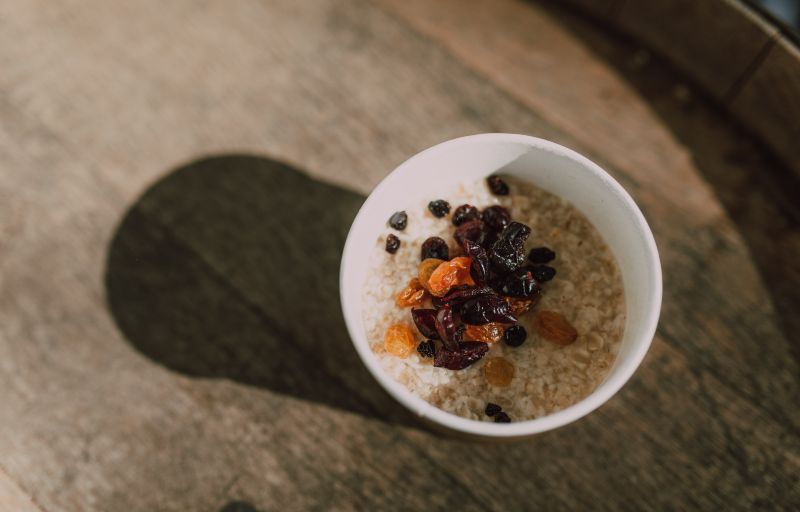
4. Banana and Coconut Water Smoothie
Keeping hydrated is so important during pregnancy, so starting your day with a banana and coconut water smoothie is a great choice. The banana will help to calm your stomach, while the coconut water adds healthy hydration as well.
5. Super Protein Chopped Salad
Give your body a boost of protein with this delicious chopped salad recipe. All of the ingredients are gentle on the stomach and are packed with healthy vitamins and minerals.
6. Ginger Cookies
Ginger is the best all-natural stomach remedy, so keeping a batch of these yummy ginger cookies on hand is a great way to keep nausea at bay.
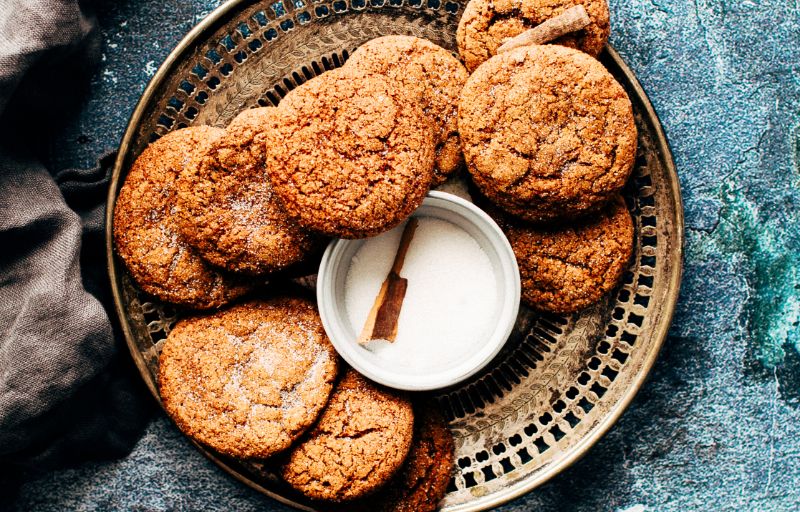
7. Homemade Almond Butter
If you love almond butter but aren’t a fan of the ones bought in the grocery store, try making your own with this super simple recipe. Almonds are not only high in protein, they are also packed with healthy fats and fibre to aid digestion.
8. Protein Balls
With protein being a top priority, it is important to find ways to stomach protein-rich foods in a way that won’t make you feel ill. These delicious protein balls give you a taste of sweetness while packing a powerful protein punch.
9. Banana Pancakes
Two-ingredient pancakes, what could be simpler? Using only bananas and eggs, these pancakes are easy to digest and full of protein and vitamins to start your day right.
10. Carrot and Ginger Soup
This soup was an absolute favorite for my friend who battled nausea throughout her entire pregnancy. When she couldn’t handle any other foods, this carrot and ginger soup was her go-to recipe. The gentle ginger flavor calmed her stomach, and she felt good knowing that she was eating something nutritious that was good for both her and her baby.
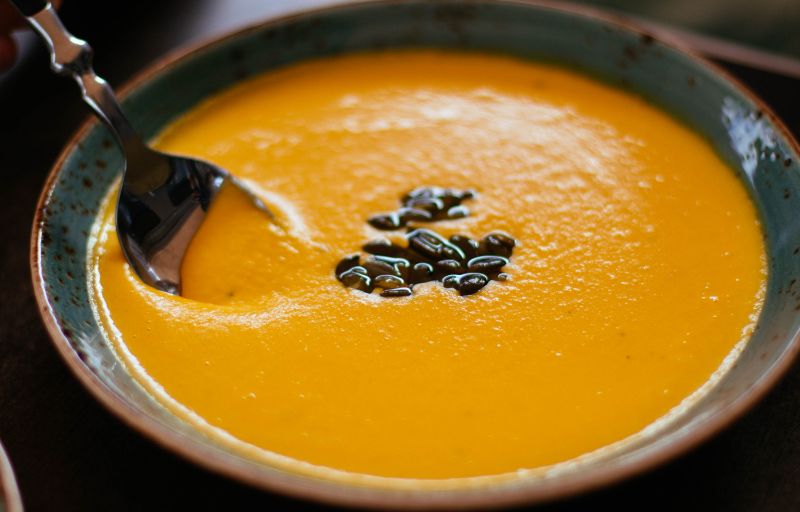
Are there foods I should avoid during pregnancy?
There are foods that can help to combat pregnancy nausea, and there are those that can make symptoms much worse. Here are the top five foods you should avoid if you are struggling with nausea during your pregnancy.
Greasy and Fatty Foods
Greasy or fatty foods are hard to digest at the best of times, so when you are already struggling with pregnancy nausea, these foods are even harder to manage. Stick to healthier foods that are easier to digest.

Milk
Some women experience nausea when consuming dairy products, so if you are finding that your morning sickness is getting worse, try eliminating milk from your diet to see if that helps or not.
Citrus
This one is controversial, because many women swear by using citrus products to help combat nausea, whereas others find it makes them feel ill. It really depends on the woman and the pregnancy, but sometimes it is better to avoid citrus products if you are dealing with severe nausea.
Overly Sweet Foods
The extra sugar in overly sweet foods can sometimes bring on nausea, as it increases your blood sugar levels, which in turn can cause your digestive system to ramp up into overdrive. If you are nauseous during pregnancy, try to avoid super sweet foods.

Spicy Food
Spicy foods or food with strong smells can often trigger nausea, so try to avoid those if you tend to have digestion problems during your pregnancy. While your baby may be craving spicy foods, they’re not the ones having to deal with the nausea!
When nothing seems to help, seek medical advice
In some cases, severe nausea during pregnancy can necessitate medical intervention. About 2% of pregnant women experience hyperemesis gravidarum (HG), where they literally cannot keep any food down and are vomiting throughout the day. In these rare cases, it is important to seek medical advice and to get help managing these symptoms.
There are certain medications that your doctor can prescribe to combat HG, and this is an important step to ensure the healthy development of your baby. Many women who experience HG are so sick that they actually lose weight during their pregnancy, which is a big concern.
If your morning sickness is getting severe to the point where you can’t keep any food down and none of these tips or tricks seem to be working, get in touch with your doctor to seek alternative solutions.
Conclusion
While there is no cure for morning sickness, there are some basic home remedies and foods that can help to relieve some of the symptoms.
Ensuring that you get enough rest and minimize stress as much as possible is important, as well as getting enough water. Eat smaller meals throughout the day, and stay away from greasy, spicy, or strong-smelling foods.
Try some of these recipes that are known to help with pregnancy nausea, and keep a stash of your favorites around the house for when needed. And just remember, once your baby is born, all this nausea will be a thing of the past!







